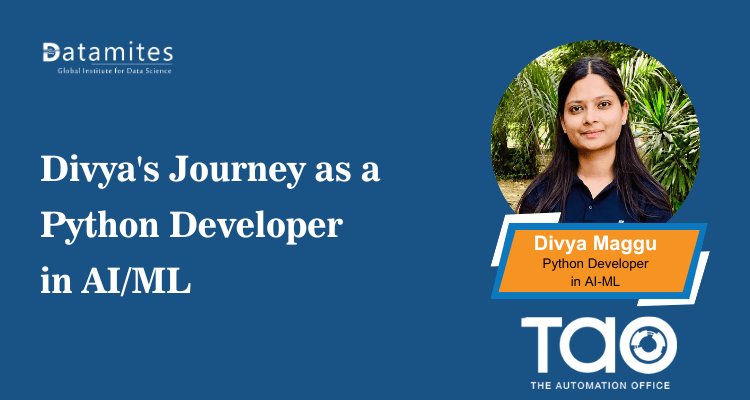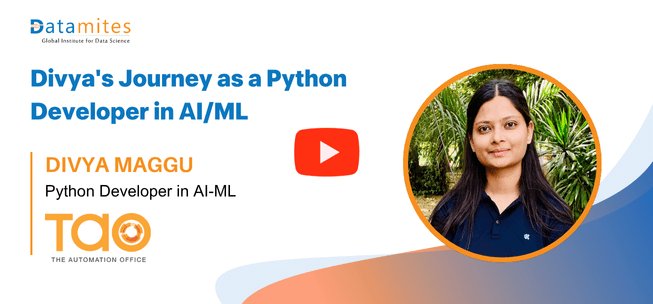Divya’s AI/ML Journey: From Learning Python to Leading AI Projects
Divya’s journey into the world of AI and Machine Learning is a testament to determination and strategic upskilling. Starting with the basics of Python programming, she steadily progressed through core AI/ML concepts, hands-on projects, and real-world problem-solving.

When Divya first typed her first line of Python code, she had no idea it would one day lead her to spearhead cutting-edge AI projects. What began as a curiosity in programming quickly transformed into a full-fledged passion for artificial intelligence and machine learning. Today, Divya is not just another tech enthusiast, she's an AI project leader driving innovation in a highly competitive industry. Her journey from a beginner with zero coding background to a confident AI/ML professional is nothing short of inspiring and it’s proof that with the right mindset and learning path, anyone can break into the world of AI. Dive into her story to discover how she overcame challenges, mastered key tools, and turned her Python skills into a powerful career in artificial intelligence.
From Interviews to GitHub: A Complete Q&A on Navigating the AIML Roadmap
In this Q&A, we cover everything from cracking interviews to building an impressive GitHub portfolio and understanding the complete AIML career roadmap.
Q1: Can you briefly introduce yourself and tell us about your background?
Hi everyone! I’m from Punjab and I completed my BTech in Computer Science. During my college days, I started exploring Python and even built some GUI-based projects. Initially, I moved towards web development, but soon I got inspired by the growing buzz around AI and Data Science. Some of my seniors encouraged me to look into it, and I began watching tutorials on YouTube. That’s when I started searching for structured training and found DataMites, which guided me toward a serious career path in data science.
Q2: How did you come across DataMites, and what was your learning experience like?
After some online research, I discovered that DataMites was highly rated, especially among institutes in South India. The team contacted me and offered a demo session with Ashok Sir, which impressed me a lot. I immediately enrolled in their artificial intelligence course and went through rigorous training. The curriculum covered everything from Python to machine learning and deep learning. I also completed an internship, which gave me hands-on project experience.
Q3: Can you describe your journey from training to your role at ExamBloom.AI?
After my training and internship with DataMites, I joined ExamBloom.AI. Initially, I worked on a computer vision project, gathering data using web scraping and aggregating it. Later, I collaborated with a senior on model training. Midway through, I was moved to an NLP project, which significantly boosted my knowledge. Eventually, I led the project and even built the full end-to-end pipeline, including deploying it using AWS cloud services.
Q4: What happened after you left ExamBloom.AI, and how did you transition to your current role?
Due to a family emergency, I had to leave ExamBloom despite being offered extended leave. After a gap of about a month, I started applying again and came across Tao Automation. The company’s focus on Python and AI for document extraction projects really appealed to me. I cleared the interview and joined the team. While the current role involves maintaining production-level applications, I’m also part of research work on NLP-based document extraction.
Q5: What new skills did you develop in your current role that differed from your previous experience?
The major shift was working with databases and data pipelines. At ExamBloom, my focus was more on AI and ML modeling. At Tao Automation, I had to learn database operations and backend management. Initially, I didn’t have any experience in DB management. However, with my manager’s support, I was given time to learn, and I took about three months to independently complete a major project. For that, I was awarded a Spot Award by my company.
Q6: What are some of the biggest challenges you face while working on AIML projects?
One of the major challenges is hyperparameter tuning. Testing various models and tweaking parameters require a lot of experimentation and precision. You also need to deeply understand the data it's the foundation of any model’s success. Whether it’s cleaning, preprocessing, or selecting the right features, data can make or break a project.
Q7: What are the most important Python libraries and tools you rely on for AIML tasks?
The AIML landscape has evolved significantly. Right now, most companies are focusing on LLMs (Large Language Models), and the go-to libraries include:
- Hugging Face Transformers – For implementing pre-trained models.
- OpenAI APIs – Widely used for generative AI applications.
- LangChain – Essential for building LLM-powered apps and pipelines.
For foundational machine learning tasks, libraries like Scikit-learn (sklearn) remain essential.
Q8: Do you believe the trend of LLMs and generative AI will continue in the next 5 years?
Absolutely! The field is not slowing down it’s expanding rapidly. Every other day, new innovations are happening that we couldn’t even imagine a few months ago. While some may think LLMs are just a passing trend, I believe they are only just beginning. The focus is moving from simply using models like ChatGPT to actually understanding and building such frameworks. In the next five years, I aim to contribute by building my own AI tools rather than just consuming existing ones.
Q9: Where do you see yourself in the next five years within the AIML space?
Rather than having a fixed destination, I believe in evolving day by day. That said, my goal is to go beyond using existing AI libraries I want to build those libraries myself. Whether it’s contributing to open-source LLMs or developing a unique AI model, I want to push my technical boundaries and ideally grow into a senior AI role, actively contributing to innovation in generative AI.
Q10: How did you land your first job in AI?
The first job came through an open drive shared by DataMites. The process was unplanned but effective:
- Got a link from DataMites for an open hiring event.
- Attended without major preparation.
Faced three rounds of interviews on the same day:
1st Round: Focused on Python and SQL (logical problems, pen-and-paper pseudo-code, no live coding).
2nd Round: Theoretical questions and project discussions (interviewers reviewed GitHub projects).
3rd Round: HR interview.
Q11: What are some projects you’ve worked on?
One notable project was PDF extraction using Computer Vision and NLP. The task involved:
- Extracting key-value pairs from scanned PDFs
- Identifying meaningful text (like dictionary words and meanings)
- Handling both text and image-based content
Q12: Final Advice for Aspiring AI/ML Professionals?
- Start with strong fundamentals: statistics, mathematics, Python, SQL.
- Build step-by-step:
Learn → Practice → Build Projects → Showcase on GitHub → Apply.
- Don’t rush to advanced AI without mastering data science basics.
- Stay consistent, even if it's just 1 hour daily.
- Be curious and persistent. Your interest will push you through long problem-solving sessions effortlessly.
Refer these below articles:
- From Learning to Leading: Priyanka’s Take on AI-ML Trends and Careers
- Atasi Dalal’s Journey: From Fresher to Machine Learning Developer
- Sarvesh’s Transformation from Software Tester to AI/ML Engineer
Key Takeaways from Divya’s AIML Journey
Divya's transition from a curious learner to an AI/ML project leader is filled with insights and actionable tips. Here are the key takeaways from her inspiring journey that can help you carve your own path in the AIML field.
Transitioned from Web Development to AI/ML
- Started with Python and basic GUI projects in college
- Shifted interest to AI/ML after exposure through seniors and online tutorials
Structured Learning via DataMites
- Enrolled in a well-rated AI course after demo session
- Gained end-to-end exposure to Python, ML, Deep Learning, and hands-on internship experience
Hands-on Industry Experience at ExamBloom.AI
- Worked on computer vision and NLP projects
- Led an NLP project pipeline and deployed it using AWS services
Smooth Career Transition Post-Break
- Joined Tao Automation after a short career gap
- Currently handling production-level applications and NLP research
Developed Strong Backend and Database Skills
- Transitioned from pure modeling to managing data pipelines and backend systems
- Earned a Spot Award for completing a major project independently
Read these below articles:
- Hyperparameter Tuning: How to Improve Your Machine Learning Model
- What Is a Neural Network?
- How to Build Your First Machine Learning Model?
Divya’s journey is an excellent example of how consistent learning, curiosity, and dedication can lead to a fulfilling career in the AIML industry. Whether you’re just starting out or looking to transition, let this be your reminder to stay updated, stay passionate, and most importantly never stop learning.
Artificial Intelligence is revolutionizing the future of work, and Chennai is emerging as a major hub in this transformation. Whether you're a student, a tech enthusiast, or a working professional aiming to upskill, there’s no better time to dive into AI. Enrolling in a reputable artificial intelligence institute in chennai can unlock valuable career prospects and empower you with the skills to excel in a technology-driven world.
DataMites is a leading training institute specializing in Artificial Intelligence, Machine Learning, Data Science, and related fields. Learners receive globally recognized certifications accredited by IABAC and NASSCOM FutureSkills, along with comprehensive placement support that includes resume building, mock interviews, and strong industry connections. The DataMites Artificial Intelligence Institute in Bangalore operates centers in Kudlu Gate, BTM Layout, and Marathahalli, offering both online and offline learning options to suit diverse learner needs.

